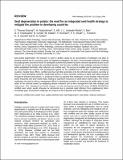Files in this item
Seed degeneration in potato : the need for an integrated seed health strategy to mitigate the problem in developing countries
Item metadata
| dc.contributor.author | Thomas-Sharma, S. | |
| dc.contributor.author | Abdurahman, A. | |
| dc.contributor.author | Ali, S. | |
| dc.contributor.author | Andrade-Piedra, J.L. | |
| dc.contributor.author | Bao, S. | |
| dc.contributor.author | Charkowski, A.O. | |
| dc.contributor.author | Crook, D. | |
| dc.contributor.author | Kadian, M. | |
| dc.contributor.author | Kromann, P. | |
| dc.contributor.author | Struik, P.C. | |
| dc.contributor.author | Torrance, L. | |
| dc.contributor.author | Garrett, K.A. | |
| dc.contributor.author | Forbes, G.A. | |
| dc.date.accessioned | 2016-08-20T23:34:32Z | |
| dc.date.available | 2016-08-20T23:34:32Z | |
| dc.date.issued | 2016-01 | |
| dc.identifier.citation | Thomas-Sharma , S , Abdurahman , A , Ali , S , Andrade-Piedra , J L , Bao , S , Charkowski , A O , Crook , D , Kadian , M , Kromann , P , Struik , P C , Torrance , L , Garrett , K A & Forbes , G A 2016 , ' Seed degeneration in potato : the need for an integrated seed health strategy to mitigate the problem in developing countries ' , Plant Pathology , vol. 65 , no. 1 , pp. 3-16 . https://doi.org/10.1111/ppa.12439 | en |
| dc.identifier.issn | 0032-0862 | |
| dc.identifier.other | PURE: 223977121 | |
| dc.identifier.other | PURE UUID: decd3b79-0ba5-4b98-a80b-c2c84971da69 | |
| dc.identifier.other | Scopus: 84955176422 | |
| dc.identifier.uri | https://hdl.handle.net/10023/9346 | |
| dc.description.abstract | Seed potato degeneration, the reduction in yield or quality caused by an accumulation of pathogens and pests in planting material due to successive cycles of vegetative propagation, has been a long-standing production challenge for potato growers around the world. In developed countries this problem has been overcome by general access to and frequent use of seed, produced by specialized growers, that has been certified to have pathogen and pest incidence below established thresholds, often referred to as certified seed. The success of certified seed in developed countries has concentrated the research and development agenda on the establishment of similar systems in developing countries. Despite these efforts, certified seed has had little penetration into the informal seed systems currently in place in most developing countries. Small-scale farmers in these countries continue to plant seed tubers acquired through the informal seed system, i.e. produced on-farm or acquired from neighbours or local markets. Informal seed tubers frequently have poor health status, leading to significant reductions in yield and/or market value. This review emphasizes the need to refocus management efforts in developing countries on improving the health status of seed tubers in the informal system by integrating disease resistance and on-farm management tools with strategic seed replacement. This 'integrated seed health strategy' can also prolong the good health status of plants derived from certified seed, which would otherwise be diminished due to potential rapid infection from neighbouring fields. Knowledge gaps, development challenges and impacts of this integrated seed health strategy are discussed. | |
| dc.format.extent | 14 | |
| dc.language.iso | eng | |
| dc.relation.ispartof | Plant Pathology | en |
| dc.rights | © 2015, Publisher / the Author(s). This work is made available online in accordance with the publisher’s policies. This is the author created, accepted version manuscript following peer review and may differ slightly from the final published version. The final published version of this work is available at onlinelibrary.wiley.com / https://dx.doi.org/10.1111/ppa.12439 | en |
| dc.subject | Certified seed | en |
| dc.subject | Potato virus | en |
| dc.subject | Quality-declared seed | en |
| dc.subject | Seed degeneration | en |
| dc.subject | Seed potato | en |
| dc.subject | Solanum tuberosum | en |
| dc.subject | SB Plant culture | en |
| dc.subject | QH301 Biology | en |
| dc.subject | Agronomy and Crop Science | en |
| dc.subject | Plant Science | en |
| dc.subject | Horticulture | en |
| dc.subject | Genetics | en |
| dc.subject.lcc | SB | en |
| dc.subject.lcc | QH301 | en |
| dc.title | Seed degeneration in potato : the need for an integrated seed health strategy to mitigate the problem in developing countries | en |
| dc.type | Journal item | en |
| dc.description.version | Postprint | en |
| dc.contributor.institution | University of St Andrews. School of Biology | en |
| dc.contributor.institution | University of St Andrews. Biomedical Sciences Research Complex | en |
| dc.identifier.doi | https://doi.org/10.1111/ppa.12439 | |
| dc.description.status | Peer reviewed | en |
| dc.date.embargoedUntil | 2016-08-20 | |
| dc.identifier.url | http://www.scopus.com/inward/record.url?scp=84955176422&partnerID=8YFLogxK | en |
This item appears in the following Collection(s)
Items in the St Andrews Research Repository are protected by copyright, with all rights reserved, unless otherwise indicated.

